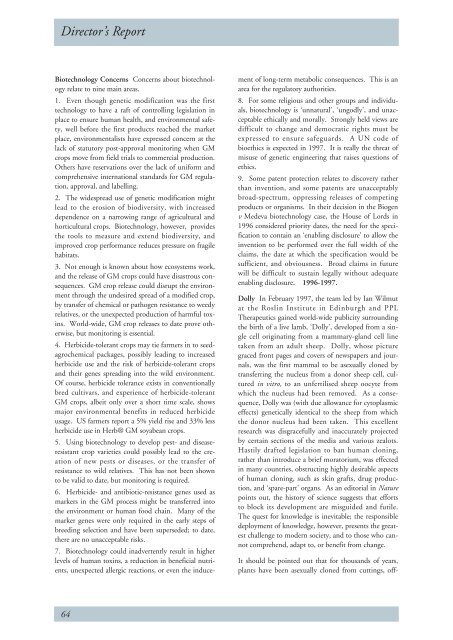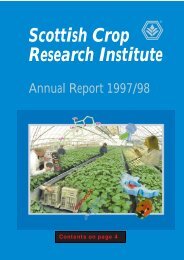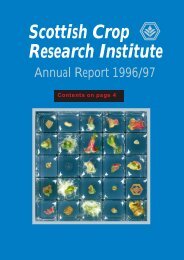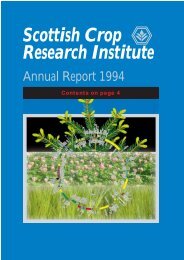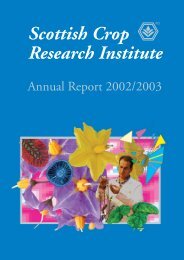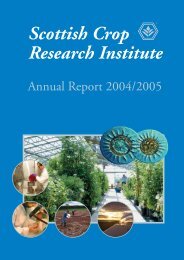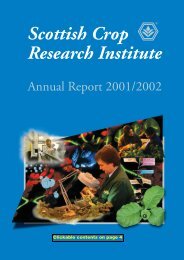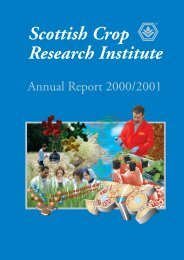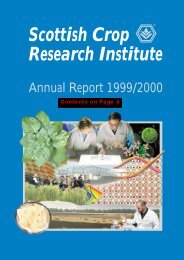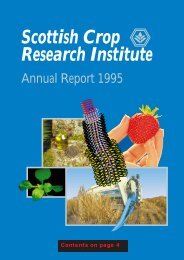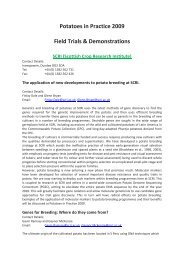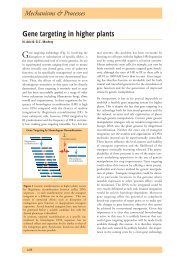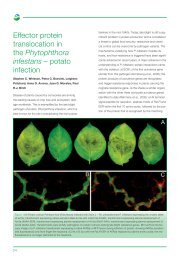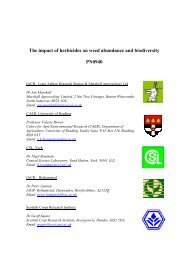SCRI Annual Report 2003/2004 - Scottish Crop Research Institute
SCRI Annual Report 2003/2004 - Scottish Crop Research Institute
SCRI Annual Report 2003/2004 - Scottish Crop Research Institute
Create successful ePaper yourself
Turn your PDF publications into a flip-book with our unique Google optimized e-Paper software.
Director’s <strong>Report</strong><br />
Biotechnology Concerns Concerns about biotechnology<br />
relate to nine main areas.<br />
1. Even though genetic modification was the first<br />
technology to have a raft of controlling legislation in<br />
place to ensure human health, and environmental safety,<br />
well before the first products reached the market<br />
place, environmentalists have expressed concern at the<br />
lack of statutory post-approval monitoring when GM<br />
crops move from field trials to commercial production.<br />
Others have reservations over the lack of uniform and<br />
comprehensive international standards for GM regulation,<br />
approval, and labelling.<br />
2. The widespread use of genetic modification might<br />
lead to the erosion of biodiversity, with increased<br />
dependence on a narrowing range of agricultural and<br />
horticultural crops. Biotechnology, however, provides<br />
the tools to measure and extend biodiversity, and<br />
improved crop performance reduces pressure on fragile<br />
habitats.<br />
3. Not enough is known about how ecosystems work,<br />
and the release of GM crops could have disastrous consequences.<br />
GM crop release could disrupt the environment<br />
through the undesired spread of a modified crop,<br />
by transfer of chemical or pathogen resistance to weedy<br />
relatives, or the unexpected production of harmful toxins.<br />
World-wide, GM crop releases to date prove otherwise,<br />
but monitoring is essential.<br />
4. Herbicide-tolerant crops may tie farmers in to seedagrochemical<br />
packages, possibly leading to increased<br />
herbicide use and the risk of herbicide-tolerant crops<br />
and their genes spreading into the wild environment.<br />
Of course, herbicide tolerance exists in conventionally<br />
bred cultivars, and experience of herbicide-tolerant<br />
GM crops, albeit only over a short time scale, shows<br />
major environmental benefits in reduced herbicide<br />
usage. US farmers report a 5% yield rise and 33% less<br />
herbicide use in Herb® GM soyabean crops.<br />
5. Using biotechnology to develop pest- and diseaseresistant<br />
crop varieties could possibly lead to the creation<br />
of new pests or diseases, or the transfer of<br />
resistance to wild relatives. This has not been shown<br />
to be valid to date, but monitoring is required.<br />
6. Herbicide- and antibiotic-resistance genes used as<br />
markers in the GM process might be transferred into<br />
the environment or human food chain. Many of the<br />
marker genes were only required in the early steps of<br />
breeding selection and have been superseded; to date,<br />
there are no unacceptable risks.<br />
7. Biotechnology could inadvertently result in higher<br />
levels of human toxins, a reduction in beneficial nutrients,<br />
unexpected allergic reactions, or even the inducement<br />
of long-term metabolic consequences. This is an<br />
area for the regulatory authorities.<br />
8. For some religious and other groups and individuals,<br />
biotechnology is ‘unnatural’, ‘ungodly’, and unacceptable<br />
ethically and morally. Strongly held views are<br />
difficult to change and democratic rights must be<br />
expressed to ensure safeguards. A UN code of<br />
bioethics is expected in 1997. It is really the threat of<br />
misuse of genetic engineering that raises questions of<br />
ethics.<br />
9. Some patent protection relates to discovery rather<br />
than invention, and some patents are unacceptably<br />
broad-spectrum, oppressing releases of competing<br />
products or organisms. In their decision in the Biogen<br />
v Medeva biotechnology case, the House of Lords in<br />
1996 considered priority dates, the need for the specification<br />
to contain an ‘enabling disclosure’ to allow the<br />
invention to be performed over the full width of the<br />
claims, the date at which the specification would be<br />
sufficient, and obviousness. Broad claims in future<br />
will be difficult to sustain legally without adequate<br />
enabling disclosure. 1996-1997.<br />
Dolly In February 1997, the team led by Ian Wilmut<br />
at the Roslin <strong>Institute</strong> in Edinburgh and PPL<br />
Therapeutics gained world-wide publicity surrounding<br />
the birth of a live lamb, ‘Dolly’, developed from a single<br />
cell originating from a mammary-gland cell line<br />
taken from an adult sheep. Dolly, whose picture<br />
graced front pages and covers of newspapers and journals,<br />
was the first mammal to be asexually cloned by<br />
transferring the nucleus from a donor sheep cell, cultured<br />
in vitro, to an unfertilised sheep oocyte from<br />
which the nucleus had been removed. As a consequence,<br />
Dolly was (with due allowance for cytoplasmic<br />
effects) genetically identical to the sheep from which<br />
the donor nucleus had been taken. This excellent<br />
research was disgracefully and inaccurately projected<br />
by certain sections of the media and various zealots.<br />
Hastily drafted legislation to ban human cloning,<br />
rather than introduce a brief moratorium, was effected<br />
in many countries, obstructing highly desirable aspects<br />
of human cloning, such as skin grafts, drug production,<br />
and ‘spare-part’ organs. As an editorial in Nature<br />
points out, the history of science suggests that efforts<br />
to block its development are misguided and futile.<br />
The quest for knowledge is inevitable; the responsible<br />
deployment of knowledge, however, presents the greatest<br />
challenge to modern society, and to those who cannot<br />
comprehend, adapt to, or benefit from change.<br />
It should be pointed out that for thousands of years,<br />
plants have been asexually cloned from cuttings, off-<br />
64


